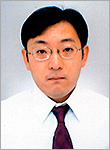
Takeshi Ishikawa

- Nagasaki University Graduate School of Biomedical Sciences, Associate Professor

- Quantum chemistry, Bioinformatics

- 1)Development of a quantum chemical program for biomolecules.
2)In silico screening using a super computer.
▼Homepage
http://www.paics.net/ishi_e.html
personal history
2005.3 Ph. D. in Quantum Chemistry, Hokkaido University
2005.4 Japan Science and Technology Agency (JST) Rikkyo University
2008.3 Center for Emerging Infectious Diseases (CEID), Gifu University
2012.4 Fracture and Reliability Research Institute, Graduate School of Engineering, Tohoku University
works/thesis
1. Theoretical study of the prion protein based on the fragment molecular orbital method,?T. Ishikawa, T. Ishikura, and K. Kuwata, J. Comput. Chem., 30 (2009) 2594
2. Interaction analysis of the native structure of prion protein with quantum chemical calculations, T. Ishikawa and K. Kuwata, J. Chem. Theor. Comput., 6 (2010) 538
3. RI-MP2 Gradient Calculation of Large Molecules using the Fragment Molecular Orbital Method, T. Ishikawa and K. Kuwata, J. Phys. Chem. Lett., 3 (2012) 375
4. Theoretical study of the two binding modes between lysozyme and tri-NAG with an explicit solvent model based on the fragment molecular orbital method, T. Ishikawa, R. R. Burri, Yuji O. Kamatari, S. Sakuraba, N. Matubayasi, A. Kitao, K. Kuwata, Phys. Chem. Chem. Phys., 2013, 15 (10), 3646